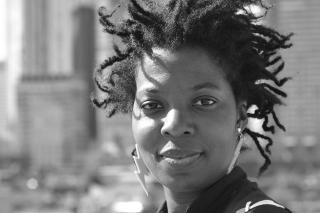Erica Walker '01 studies how a noisy environment impacts our health.
Tell us about your background and your current role.
I graduated from Simmons in 2001 with my bachelor’s degree in economics and mathematics and went on to teach math in the Boston Public Schools. In 2008, I was living as an artist using my apartment as my studio when neighbors with two small children moved in above me. They used to run the length of their floor — and my ceiling — for the entire day. The noise was disruptive and ruined my productivity and, finally, my health. I started recording the sounds and the time periods, and in sharing my annoyance with others and researching how to tackle this problem, I realized two things: I was far from alone in dealing with noise issues in shared space environments and there were few accessible resources available to help me combat this issue.
At the same time, I was accepted to the Master’s program for environmental economics and urban planning at Tufts University, where I learned about this field called Public Health. Following that degree, I was admitted to the Harvard T.H. Chan School of Public Health where I completed my doctorate in Environmental Health. It was here that I also started to document my dissertation work and started Noise and the City. Through this channel, I was able to create and release The Greater Boston Neighborhood Noise Survey. The analysis of this survey in 2016 made it Greater Boston’s first interactive noise report and the second noise survey since the early 1970s. We were blown away by the attention this report received.
Can you tell us about NoiseScore? What drove you to create it?
While noise is very much a dynamic issue, my report was static. I needed to find a way to reflect this dynamic nature in my work going forward. I remember being down about it so my best friend took me on a drive to lift my spirits. While on that drive, I received an email from the Radcliffe Institute for Advanced Studies offering me no-strings attached funding. I asked for a bit more money because I wanted to create an app, which would allow me to finally capture the dynamic nature of a city’s sound levels. I was apprehensive about asking for more money but I knew it was worth a shot. The worst they could say is no, and a no is the beginning of a yes. It’s important to be clear on your goals, and to share them if an opportunity presents itself.
The app was released in September 2017.
Can you also tell us about Community Noise Lab?
After the app was released, I was applying for postdoctoral research positions. I knew that I wanted to continue with my noise research but also knew that I wanted to innovate. I took time off to apply for two grants — one from the NIH and one from The Robert Wood Johnson Foundation. Both were funded and I began my work at Boston University’s School of Public Health. I also started Community Noise Lab. Our lab is tackling community identified noise issues in Greater Boston and working with four communities: Fenway, Mission Hill, East Boston and Andover. We are conducting real-time noise monitoring, supporting citizen science campaigns using our NoiseScore app, conducting laboratory-based experiments, and hosting a series of community engagement events. I am excited about redeveloping NoiseScore and updating it based on our pilot feedback.
How did your Simmons education prepare you for your professional life and current research path?
A foundation in math gave me great problem-solving skills, which are very useful when conducting academic and community driven research. I also took a few photography classes and take all of the photos for our website! I liked the small class sizes and enjoyed the opportunity to talk to my professors directly. I forged relationships that still persist and still speak to many of my professors to this day.
Do you have any advice for someone looking to create a venture from something they're passionate about?
This may come across as harsh, but if it’s not an organic passion then you shouldn’t pursue it. With any major undertaking, you have to be really invested. For every good day, there are soul-crushing bad ones. However, if it is your passion, then for every setback you have, instead of sulking or quitting, you learn from it and bounce back because you know exactly why you are doing it all in the first place. Setbacks are adjustments, not signs to quit. You also have to be ruthless and the person who believes in what you are doing the most. You have to know when to cut out the naysayers and keep on moving. Do you know how many times people have told me that all of this is stupid?
Do you have any favorite quiet spots around Boston that you’re willing to share?
Yes, there is the Kevin W. Fitzgerald Park in Mission Hill. It has to be the most serene place in the city and the views are spectacular.

